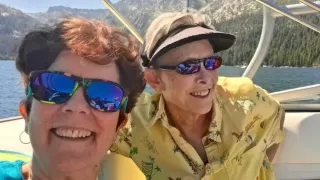July 3, 2020
A Short Summer Outdoor Season May Put Chicago's LGBTQ Bars at Risk of Closing
Matthew Wexler READ TIME: 3 MIN.
EDGE spoke with LGBTQ bar owners, nightlife entrepreneurs and elected officials who are determined to weather a storm that doesn't appear to be passing any time soon. Our in-depth feature profiled case studies from across the country. Here's a look at how two New York City bar owners are hoping to survive.
"I've never worked harder to make no money," says Chicago's Mark Liberson. The entrepreneur owns several queer-friendly venues in Boystown and Andersonville, chairs the Pride Fest and North Halsted Market Days committees, and is on the brink of launching Puerto Vallarta's inaugural H20 Festival this November. When the nation began shuttering in mid-March, the nightlife vet made a proactive move to close his venues before the official directive from the city, saying, "I was terrified for my team. These are people that have been with us a long time."
Even before coronavirus dismantled the industry, Liberson was accustomed to fielding questions about the future of LGBTQ nightlife, calling it a "synthetic conversation."
"People need people," says Liberman. "I remember when Grindr first began and people said, 'Now that we have hook-up apps we don't need to go to bars.' People enjoy going to an environment that we can provide, and I don't think that will change. They'll always question, 'Why do we need this?' The LGBTQ community shares a lot of differences, but we also share things that unite us."
Initially thinking that closures would be weeks rather than months, Liberson and his senior management team quickly set up "Quarankiki," a weekly virtual dance party with some of the world's best DJs. Artists, performers, employees and DJs received 100 percent of the proceeds.
Senior staff volunteered their time to self-produce each installment, running the live streams like a rogue virtual television show and cutting between DJs and participants from around the world, many of whom donned outrageous and creative costumes in their living rooms, Liberson says his team "took it extremely seriously and were protective of the integrity of the program."
Now more than three months in, bills without business continue to accumulate. Many bars face liquor renewals and utility bills, even though their establishments still aren't permitted to open unless they serve food. Cocktail delivery and pick-up was just approved by City Council but doesn't offer nearly enough revenue stream to stay afloat.
"I know this will come to an end," states Liberson. "The question is, how soon? We all wish we had the answer. I don't know how to turn on an economy after you've turned it off. We've had hiccups, and there's a lot more to come. We've learned a lot since this virus began. One choice is to stay at home and not do anything. It's not a solution. There are risks involved in everything. We have to limit risks and try to return to some kind of functioning world."
Liberson recalls the beginning of the AIDS epidemic, the quickly evolving panic and the difference in the nation's response. "I was born in 1962 and out during the AIDS crisis, and remember how scary it was. We began to realize that whoever you slept with, you were also sleeping with whoever they slept with. In this case, whoever you breathe with, you're breathing with whoever they breathed with. It's a stark reality. The good news here is that the scientific community is united in trying to find a solution, whereas, for the LGBTQ community, it took a long time before science or the government took an interest."
Liberson is a member of a reopening committee that has been advocating for safe and modified reopenings, that will heavily rely on outdoor spaces. But with a limited summer and those frigid, gusty Lake Michigan winds just months away, time is of the essence if businesses hope to capitalize on Chicago's short summer season.
"We're resilient. I do believe we'll recover," says Liberson. "It's just a matter of when. Remember, the last pandemic led into the Roaring 20s."






